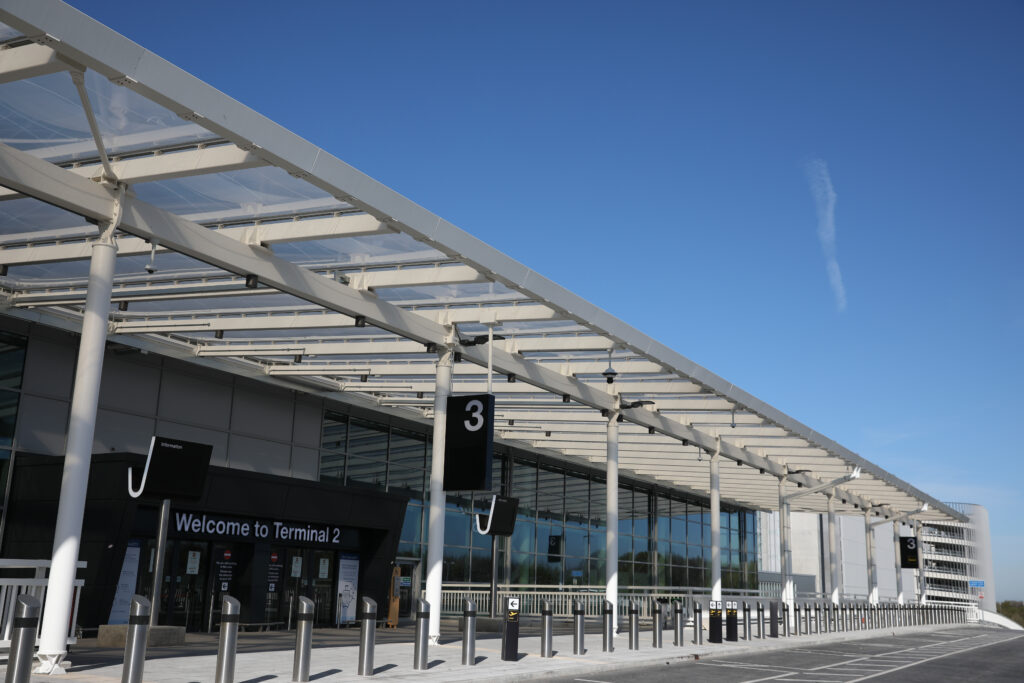Manchester Airport will now have a direct feed of sustainable aviation fuel (SAF), thanks to its partnership with Fulcrum BioEnergy.
The SAF will be transported directly from the production plant to Manchester Airport via an existing pipeline. A new SAF refinery at Stanlow called Fulcrum NorthPoint will produce approximately 100 million liters of SAF per year – which, when blended 50/50 with traditional jet fuel, could fill the fuel tanks of approximately 1,200 Boeing 777-300s. Once blended and certified, the SAF can be used in aircraft without modifications. The fuel produced will have a CO2 footprint at least 70% lower than that of its traditional jet fuel equivalent and will be produced from residual household and commercial wastes, which would otherwise be destined for landfill or incineration. The partnership hopes to see up to 10% of the fuel used by aircraft at Manchester Airport replaced with SAF within five years of the Fulcrum NorthPoint facility becoming operational.
Fulcrum BioEnergy is developing Fulcrum NorthPoint using proven technologies currently being deployed at its facility in Nevada, therefore significantly reducing typical ‘first of a kind’ risks normally associated with new technology. Fulcrum was recently shortlisted for funding from the Department for Transport’s Green Fuels, Green Skies competition, the proceeds of which will help develop the NorthPoint project further.
The partnership will also work to support a sustainable recovery from the pandemic, promoting green skills and jobs across the sector. Research by E4Tech in a Sustainable Aviation publication from 2020, showed that a North West SAF cluster could generate up to 1,520 jobs and £219m (US$299m) GVA annually in the North West and a total of 6,500 jobs and £929m (US$1.3bn) GVA annually across the UK. For this reason, MAG also plans to explore opportunities to supply SAF to its other two airports at London Stansted and East Midlands, UK, within its partnership with Fulcrum.
MAG’s partnership with Fulcrum follows the announcement last year of a competition to offer five years of free landing charges to the first zero-emission flight from a MAG airport, valued at over £1m (US$1.3m), demonstrating the group’s commitment to the decarbonization of the wider aviation sector.
The agreement was backed by UK business secretary Kwasi Kwarteng, who said, “This partnership is a huge leap forward for the long-term competitiveness of Britain’s aerospace sector, demonstrating how, by going green, industry can create jobs and help level up across the UK. Cleaner aerospace and aviation are at the center of our plans to end the UK’s contribution to climate change by 2050. That is why we are backing sustainable aviation fuel with £180m [US$246m] of support and working with industry to turbocharge low-carbon aerospace innovation with £3.9bn [US$5.3bn].”
Neil Robinson, corporate social responsibility director and airspace change director at MAG, said, “By working toward a future supply of SAF, direct to Manchester Airport via existing pipelines from a local refinery, we’re making sustainable operations accessible for airlines based here. We are committed to ensuring that this progress continues through our role on the government’s Jet Zero Council on sustainable aviation and through our own targets in our CSR strategy, where we’re working to become net zero at our airports by 2038.”
Tim Alderslade, CEO of Airlines UK, said, “SAF is today’s technology and proof positive that UK aviation has a bright and sustainable future ahead of it on our road to net-zero carbon. Today’s announcement from MAG and Fulcrum marks a key milestone, as innovation moves toward reality with airlines soon able to make use of SAF from Manchester Airport, lowering our sector’s environmental impact and showing just what can be done here in the UK.”
Jeff Ovens, managing director of Fulcrum BioEnergy, said, “Support for SAF in the UK has reached new heights and the development of the Fulcrum NorthPoint SAF facility in Cheshire will bring significant volumes of much-needed low-carbon fuel for airlines, either those based here in the UK or flying in from overseas. Our partnership with MAG as an airport operator will bridge airlines and fuel suppliers and make SAF accessible and more widespread within the sector.”

